No new survivors or
bodies have been found since the early hours after the tornado carved a
trail 17 miles long on Monday afternoon.
"We feel like we have
basically gone from rescue and searching to recovery," Glenn Lewis, the
mayor of hard-hit Moore, told CNN's Anderson Cooper.
Lewis said he didn't
expect the death toll to climb any higher. At least 24 people, including
nine children, were killed, according to the state medical examiner's
office.
"I think that will stand," Lewis said.
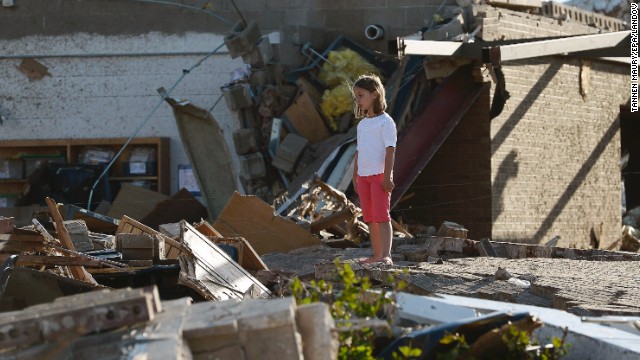 Photos: Deadly tornado hits Oklahoma City area
Photos: Deadly tornado hits Oklahoma City area
Teacher used music game to calm class
Reality sets after deadly tornado
Woman reveals grandparents missing
Earlier reports of at
least 51 deaths were erroneous, said Amy Elliot, chief administrative
officer for the Oklahoma Office of the Chief Medical Examiner. In the
chaotic aftermath of the tornado, Elliot said it appeared some of the
dead were counted twice.
'One of the strongest storms'
Damage assessments
conducted Tuesday showed the tornado packed winds, at times, between 200
and 210 miles per hour, making it an EF5 -- the strongest category of
tornadoes measured, the National Weather Service said Tuesday.
Teams are still
evaluating the destruction, and the rating released Tuesday is
preliminary. So far, they've found that the tornado's width spanned 1.3
miles -- the length of more than 22 football fields lined up end-to-end.
Given its breadth and
power, it ranks among some of the strongest storms ever to strike the
United States, CNN senior meteorologist Dave Hennen said.
Hardest hit was Moore,
Oklahoma -- a suburban town of about 56,000 and the site of eerily
similar twisters in 1999 and again four years later.
The scene -- block after
block of flattened homes and businesses, the gutted remains of a
hospital and hits on two elementary schools -- left even seasoned
veterans of Oklahoma's infamous tornadoes reeling.
The devastation was so
complete, the mayor said city officials were racing to print new street
signs to help guide rescuers and residents through a suddenly twisted
and unfamiliar landscape.
A search-and-rescue team
was sent from nearby Tinker Air Force Base, which also provided search
lights, vehicles and water trucks, while neighboring Texas sent an elite
80-member urban search team. The American Red Cross sent 25 emergency
response vehicles.
Rescue crews were expected to complete a search for victims by late Tuesday, Moore Fire Chief Gary Bird told CNN.
"We will be through
every damaged piece of property in this city at least three times," Bird
told reporters. "And we hope to be done by dark tonight."
More than 230 people were injured, according to authorities.
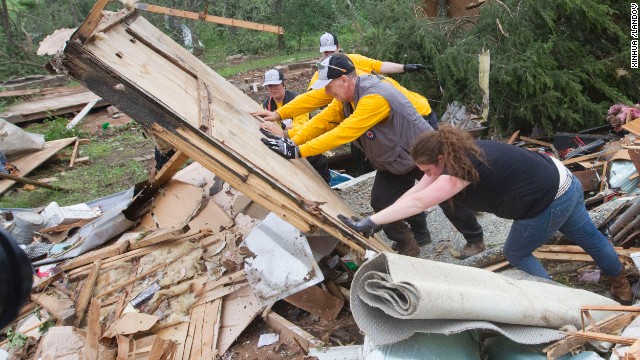 Photos: Tornadoes strike Midwest
Photos: Tornadoes strike Midwest
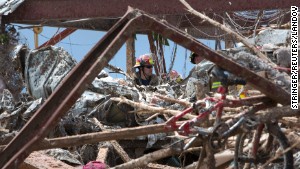 Oklahoma Lt. Gov.: Death toll is small
Oklahoma Lt. Gov.: Death toll is small
'Can't believe this'
Some residents of Moore returned home to piles of debris, hoping to find pictures or some memento.
"You just wanna break
down and cry," Steve Wilkerson told CNN, holding a laundry basket that
contained the few, intact belongings he could find.
"But you know, that's how it goes," Wilkerson said, his voice shaking. "You gotta be strong and keep going."
Wilkerson has been through tornadoes before, but nothing like this one.
"I still can't believe this is happening," he said. "You work 20 years, and then it's gone in 15 minutes."
All that remained in
some places were "sticks and bricks," Fallin told reporters, calling the
storm one of the "most horrific storms and disasters that this state
has ever faced."
Police, firefighters,
volunteers and nearly 180 National Guard troops joined forces Tuesday in
searching the rubble and securing areas hit by the storm.
The weather wasn't
cooperating with their efforts: National Weather Service crews surveying
the damage in Moore reported rain, half-inch hail and 45-mph winds over
the debris field.
The Oklahoma Highway
Patrol asked motorists to steer clear of Interstate 35 near Moore to
free up lanes for disaster response resources streaming into the area.
And so many people were showing up to volunteer that authorities had to plead with would-be rescuers to stay away.
Path of devastation
The tornado struck at
2:45 pm C.T. on Monday -- only 5 minutes after the first warnings went
out, according to the National Weather Service.
Moore residents had
about 30 minutes before the massive storm entered the western part of
the city, CNN meteorologist Sean Morris said.
Among the many buildings struck by the storm were two schools: Plaza Towers and Briarwood elementaries.
Of the nine children
killed by the storm, authorities said seven died at Plaza Towers
Elementary School where the tornado ripped the roof off and collapsed
walls.
Among the dead is 9-year-old Ja'Nae Hornsby, who was killed at Plaza Towers, her father told CNN's Anderson Cooper.
About 75 students and staff members were hunkered down in Plaza Towers when the tornado struck, CNN affiliate KFOR reported.
At one point, an estimated 24 children were missing from the school, but some later turned up at nearby churches.
On Monday, a father of a
third-grader still missing sat quietly on a stool outside. Tears
cascaded from his face as he waited for any news.
Even parents of survivors couldn't wrap their minds around the tragedy.
"I'm speechless. How did
this happen? Why did this happen?" Norma Bautista asked. "How do we
explain this to the kids? ... In an instant, everything's gone."
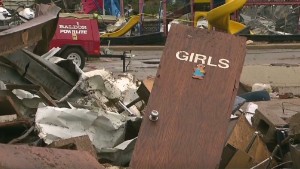 Heroic teacher saves kids in bathroom
Heroic teacher saves kids in bathroom
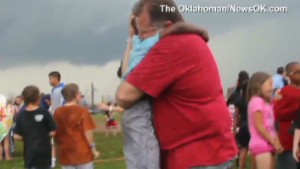 Boy, neighbor embrace after tornado
Boy, neighbor embrace after tornado
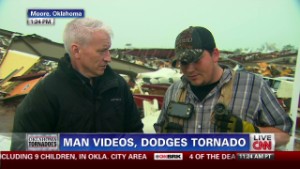 Man videos and dodges tornado
Man videos and dodges tornado
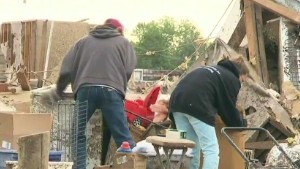 Victims risk returning to homes
Victims risk returning to homes
'It's heartbreaking'
James Dickens, a gas-and-oil pipeline worker, grabbed his hard had and joined other rescuers at Plaza Towers Elementary School.
"I felt it was my duty to come help," he said Tuesday after a long night of searching.
"As a father, it's
humbling. It's heartbreaking to know that we've still got kids over
there that's possibly alive, but we don't know."
Moore, and the Oklahoma
City region, are far too familiar with disaster. In 1995, 168 people
died in the bombing of the Alfred P. Murrah Federal Building in Oklahoma
City.
In 1999 and then again
in 2003, Moore took direct hits from tornadoes that took eerily similar
paths to Monday's storm. The 1999 storm packed the strongest wind speeds
in history, Lt. Gov. Todd Lamb said.
"We're a tough state. This is a tough community," Lamb said. "There is hope. We always have hope. We always have faith."
President Barack Obama, pledging whatever federal aid Oklahoma would need, praised teachers who protected their students.
"If there is hope to
hold on to -- not just in Oklahoma but around the country -- it's the
knowledge that the good people there and in Oklahoma are better prepared
for this type of storm than most," he said. "And what they can be
certain of is that Americans from every corner of this country will be
right there with them, opening our homes, our hearts, to those in need,
because we're a nation that stands with our fellow citizens as long as
it takes."
More trouble brewing
The storm system that spawned Monday's tornado and several other twisters Sunday isn't over yet.
Southwest Arkansas and
northeast Texas, including Dallas, are under the gun for severe weather
Tuesday. Those areas could see large hail, damaging winds and tornadoes.
A broader swath of the United States, from Texas to Indiana and up to Michigan, could see severe thunderstorms.
"We could have a round 3," CNN meteorologist Ivan Cabrera said. "Hopefully, it won't be as bad."
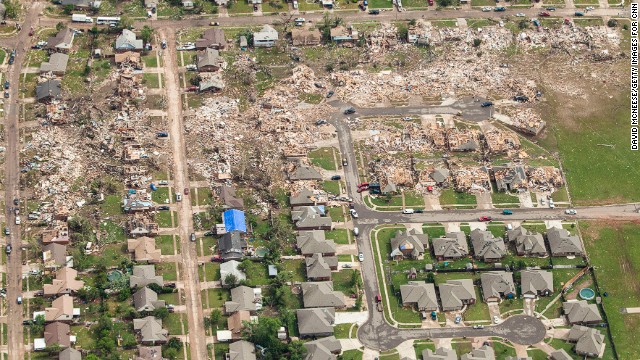 An aerial view of the destruction
caused by the massive tornado that struck areas south of Oklahoma City
on Monday, May 20, shows the magnitude of damage left in its path. The
storm's winds topped 200 mph as it
An aerial view of the destruction
caused by the massive tornado that struck areas south of Oklahoma City
on Monday, May 20, shows the magnitude of damage left in its path. The
storm's winds topped 200 mph as it
No comments:
Post a Comment